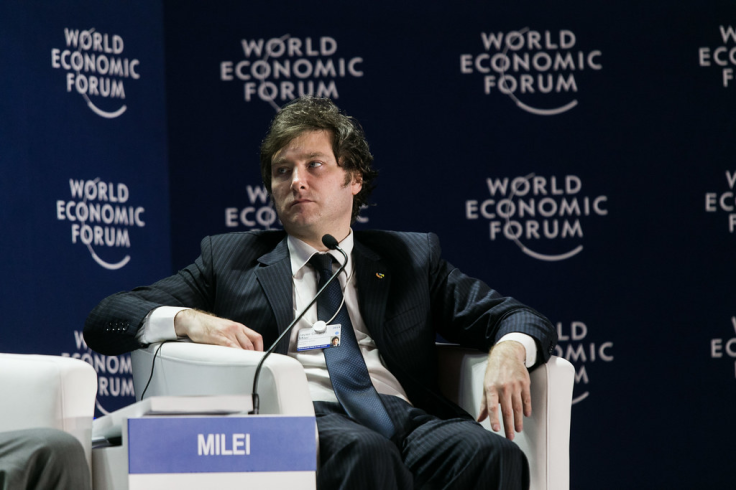Argentina Needs Reform, But Milei's Anarcho-Capitalism Would Spell Disaster
The second and final round of Argentina's election on November 19th will be a dead heat between the centrist economy minister Sergio Massa and Javier Milei of the hard right La Libertad Avanza.
Massa may have won the first round by a healthy 6% to the surprise of pollsters, but much of the remaining conservative base is now expected to fall in behind Milei.

An avowed libertarian, Milei's most notable pledges include a swinging 15% cut to public spending, shuttering the central bank, and replacing Argentinian pesos with US dollars as the unit of currency.
Argentina's sickly economy undoubtedly requires healing, but Mileism is more likely to kill the patient, crushing the country's prospects with a ruthless deflationary agenda and consequent debt bondage to the IMF and China, its largest creditors.
Blue-collar voters must therefore keep their faith in Argentina and indeed South America's unique brand of social democracy, albeit one injected with a dose of reform and renewed collaboration with external partners to stabilise sovereign debts.
A popular target for those on the neoliberal right, the South American social democratic tradition, embodied by the Peronist movement in Argentina, has a proven track record of poverty eradication and pro-worker policies.
Between 2003 and 2011, to the chagrin of its critics, these efforts were supported by remarkable economic growth of 9% year-on-year under the Peronist presidency of Néstor Kirchner (2003-2007) and his wife and successor Cristina Fernández de Kirchner (2007-2015).
Even as growth has faltered over the past decade, the gains for Argentina's poorest have held. Indeed, while 30% of the population lived in poverty in 2001, just over 10% do so today – a victory for progressive policy in every sense.
Massa, a fellow Peronist and close ally of the now Vice President Señora de Kirchner, is the heir apparent to this legacy.
In contrast, Javier Milei views the Kirchners (and Massa by extension) as being part of a rotten 'caste' of politicians who are at best 'criminals', at worst 'vermin'.
Slashing spending on welfare and public services, as well as closing the ministries responsible for education, health, social development, and labour, is all part of Milei's grim odyssey to oust Peronists and punish those that have voted for the movement in the past.
If his political outlook and fiscal plans are regressive, Milei's monetary policy is suicidal.
In short, he plans to 'blow up' Argentina's central bank to then fully dollarise the economy in an effort to cool high inflation.
Under dollarisation, Argentinian workers and banks would be forced to surrender their pesos for dollars, thus preventing the government from printing more currency to maintain living standards and debt repayments amid an economic slump.
Robbed of its monetary independence, for only the Federal Reserve can print dollars, Milei promises that inflation would subsequently fall in line with a sharp constriction in the money supply.
That's the theory, but even Milei's own advisors admit that enacting full dollarisation will require at least $40 billion.
For one, Argentina's central bank only has $5 billion in reserves. The country is also highly dependent on its $20 billion swap line with China, alongside the $17 billion worth of state-backed, dollar-denominated loans disbursed under the Belt and Road Initiative (BRI).
Milei, though fiercely hostile to China, is pushing a dollarisation policy that paradoxically relies on the generosity and forbearance of Xi Jingping's government – a foolhardy strategy given China's refusal to haircut the sums owed by its other debtors (see Sri Lanka and Zambia).
Defaulting on BRI loans, unlike failing to pay the IMF, would leave a number of Argentina's most important industries, from nuclear energy to telecommunications, at China's mercy.
Such a scenario is more likely than not if Milei is true to his word on policy.
While prices might fall as a Milei government attacks the money supply, so would economic activity, depressing wages and growth and thus instituting the aforementioned fiscal crisis that would bury Argentina under its foreign debts.
Venezuela, which faces similarly high inflation, has had success restraining price rises by allowing dollars to be used for certain transactions.
However, the country still has an active central bank and therefore retains monetary policy autonomy as a prerequisite for supporting economic growth and living standards under pressure from external actors.
Milei has no interest in such a pragmatic approach to dollarisation, while his nihilistic policies would have the same grim impact on Argentinian workers that US sanctions have had on Venezuelans.
Mileism, therefore, is not just soulless but intellectually bankrupt. Massa's coalition of workers and middle-class progressives seem to understand that, but there is work to be done to convince their follow patriots.
Indeed, Argentina's electorate must get behind the banner of reform under social democratic leadership, or face Milei's homespun brand of economic self-immolation.





















